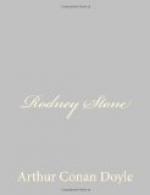“You remember me, Sir Charles Tregellis,” said she, coming forward, as we sprang down from the curricle.
My uncle looked hard at her with a puzzled face.
“I do not think that I have the privilege, madame. And yet—”
“Polly Hinton, of the Haymarket. You surely cannot have forgotten Polly Hinton.”
“Forgotten! Why, we have mourned for you in Fops’ Alley for more years than I care to think of. But what in the name of wonder—”
“I was privately married, and I retired from the stage. I want you to forgive me for taking Jim away from you last night.”
“It was you, then?”
“I had a stronger claim even than you could have. You were his patron; I was his mother.” She drew his head down to hers as she spoke, and there, with their cheeks together, were the two faces, the one stamped with the waning beauty of womanhood, the other with the waxing strength of man, and yet so alike in the dark eyes, the blue-black hair and the broad white brow, that I marvelled that I had never read her secret on the first days that I had seen them together. “Yes,” she cried, “he is my own boy, and he saved me from what is worse than death, as your nephew Rodney could tell you. Yet my lips were sealed, and it was only last night that I could tell him that it was his mother whom he had brought back by his gentleness and his patience into the sweetness of life.”
“Hush, mother!” said Jim, turning his lips to her cheek. “There are some things which are between ourselves. But tell me, Sir Charles, how went the fight?”
“Your uncle would have won it, but the roughs broke the ring.”
“He is no uncle of mine, Sir Charles, but he has been the best and truest friend, both to me and to my father, that ever the world could offer. I only know one as true,” he continued, taking me by the hand, “and dear old Rodney Stone is his name. But I trust he was not much hurt?”
“A week or two will set him right. But I cannot pretend to understand how this matter stands, and you must allow me to say that I have not heard you advance anything yet which seems to me to justify you in abandoning your engagements at a moment’s notice.”
“Come in, Sir Charles, and I am convinced that you will acknowledge that I could not have done otherwise. But here, if I mistake not, is Sir Lothian Hume.”
The yellow barouche had swung into the avenue, and a few moments later the weary, panting horses had pulled up behind our curricle. Sir Lothian sprang out, looking as black as a thunder-cloud.
“Stay where you are, Corcoran,” said he; and I caught a glimpse of a bottle-green coat which told me who was his travelling companion. “Well,” he continued, looking round him with an insolent stare, “I should vastly like to know who has had the insolence to give me so pressing an invitation to visit my own house, and what in the devil you mean by daring to trespass upon my grounds?”




